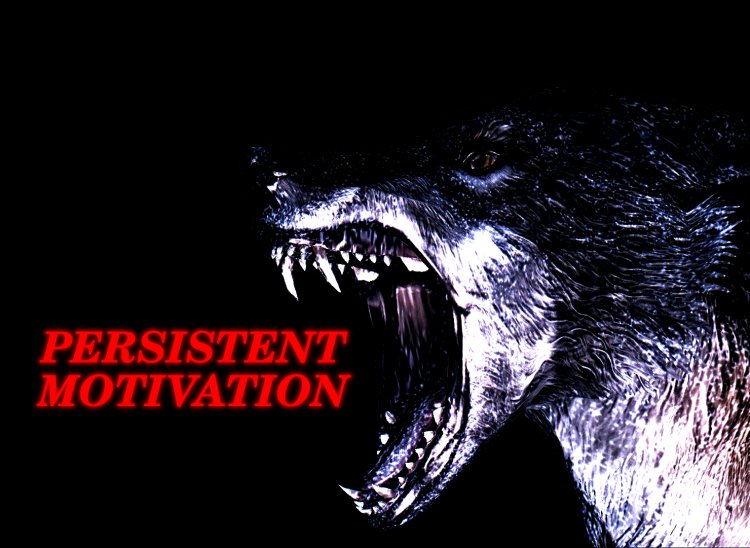How to Provide Persistent Motivation in 5 Steps
How is motivation provided? By reading motivational quotes, watching motivational videos, and listening to motivational music? Is motivation the only force that pushes you to do that hard work and is absolutely necessary? No! That's not motivation. So what is motivation? There is only one purpose in your mind and classic questions about it; how to increase motivation, how to provide motivation, how to regain motivation, how to keep it high, how to measure it, what exactly is this motivation?

1. There is no such thing as motivation!
Today, some research on the placebo effect shows that the existence of something called motivation is questionable. When it comes to motivation, everyone has almost the same answer. No one knows that motivation is an illusion. Almost all of the people you ask what is motivation on the street will say, “The desire to do something”. Are you ready? There is no such thing as motivation, motivation is an illusion, a temporary placebo effect, that is basically a temporary effect based on psychological influence, caused by some factors in your environment or expectations within yourself, apart from certain basic instincts! You create the motivation and desire that you believe you should have for yourself, but after a while, your brain realizes that this is self-deception and you lose your so-called motivation! In essence, human beings do not have any other motive other than eating, drinking, sheltering, and breeding. So aside from these four things, the belief that you have to have a will to do something is as absurd as desiring something that doesn't exist! You are so programmed with the motivational suggestions that come from your environment and that you produce within yourself that your brain tries to create such a thing within itself, tries to create that myth called motivation and it succeeds! As a result, however, the brain can only manage to deceive itself for a while. Eventually, this deception will come to an end and the false inner desire called motivation will last a very short time because it doesn't actually exist, it's just an illusion. As such, "How do I regain my motivation?" "How can I deceive myself to the point of wanting to do certain jobs?" is equivalent to the question. Accept this fact "THERE IS NO SUCH THING AS MOTIVATION!".
2. Movement-> Thought -> Emotion -> Perception, NOT Perception -> Emotion -> Thought -> Movement
Think of a soldier or a father who has to take his bread home or an important person who has to accomplish an important job. See how motivated they are. Ask them what motivation they are acting on. Let me tell you, you won't find anything. They will also give different and ambiguous answers to this question. Again, there is no such thing as motivation. You can't describe something that doesn't exist.
You cannot achieve anything as a disciple of motivation whose Perception->Emotion->Thought->Movement chain is persistently coded into his mind. You have believed the opposite of how your brain works and you have deceived yourself. You first construct a perception (perspective), then wait for it to bring emotion (discomfort or necessity), then think and believe that you need to think (plan) what to do, and then FINALLY act! Don't die donkey, the road is long, don't die! Even if It usually does not die in any transition, that deceived donkey dies when It moves from thought to action.
However, you must reject the deception and accept the truth about motivation. In fact, when we look at the studies on productivity, the opposite of this chain works in the brain. First, you take action, then you develop different thoughts and plans about the continuation of this action, then appropriate emotions are formed as feedback about that action, then a perception (perspective) is formed with the combination of emotions.
First, you start the sport by taking the dumbbells in your hand, then you think and plan the next sets, the exercises you will do while moving, then when you look at your twitching muscles, the strong and sweaty man in the mirror, a positive feeling occurs and the emotional states accumulated as a result of these movements provide you with the appropriate perception (perspective) about sports and healthy life.
In other words, action is not affected and the mind is not effector as a motivational disciple believes! On the contrary, the movement is active and the mind is passive to keep up with that movement. Stop waiting for your emotions and inner world to affect your actions and the outside world! This is bullshit! In fact, as everyone will look back and see clearly the evidence somewhere, on the contrary, as a brutal truth, the outer world and your actions affect your inner world and emotions. Sitting as an adult next to a baby crying with the baby and waiting for the action to come to you, don't do it! Baby does this because the baby cannot move, but you can move. You are not the crying baby waiting for action, you are the movement helping the crying baby. Take that heavy load on your back and carry it, then cry as much as you can while carrying it, think as much as you can because that's what adults do. Adults cry while they do it, children first tries to cry, or when they have to stop crying and do it themselves, or maybe if they're not "motivated" enough, they look at their parents with tearful eyes to "get motivated", to get the placebo which they're addicted to. Come on baby, you can walk, look first the right and then the left foot, come on! Look how I'm walking, look how little Betty is walking in the same conditions as you! Believe you can walk, baby! I would write encouraging words of motivation to this post and make content easily and make you come here many times. Besides, people like to read what is easy for them more, but I didn't, I didn't do it so you can understand the truth. An adult travels in the direction of Movement-> Thought -> Emotion -> Perception, a child in the direction of Perception -> Emotion -> Thought -> Movement. MOVE! If you are going to the gym and you have no idea, at least wear that sweatpants, you can cry and think in your sweatpants, and with dumbbells in your hand! Crying and thinking while doing is more satisfying than crying and thinking about doing, it gives more satisfaction.
3. Avoid heavy transitions!
Like a classical motivational disciple, don't give up because of learned helplessness by getting caught up in your sense of life and vision. Again and again don't stick on thinking, planning, and dreaming about lifting a big rock in a jiffy. Instead, try to lift the rock directly, struggle, rebel, cry and think at the point where you realize you can't lift it, plan and create your long-term perception and vision that you will break the rock into pieces and move the rock forward piece by piece to your goal. Once you were carrying stones, crying, and thinking, a hot stone house appeared in front of you which you made! This is how this website and dozens of articles I wrote appeared, if I had imagined such a site with everything and dozens of content before I wrote code, I would definitely say that it would exceed me. I thought and planned most of the things and most of the content you see on the right and the left while I was writing code in discomfort and pain. I have a very interesting vision and a perception about this website that wasn't there when I started writing code in the first place.
4. Don't limit yourself to external rewards, include internal rewards as well.
Sit down and look at what you're doing and how you're doing it. Think about what you've accomplished and how you accomplished this thing. In this way, establish the necessary cause-effect relationship in your mind. Looking back and thinking about what you have accomplished and how you achieved it, triggers a very primitive but very important structure in your brain. Reward-punishment mechanism. As soon as you look at your exam result, a series of new connections are formed in your brain. In that process when you see your exam result, your brain can establish any of the correlations of working->success or not working->failure. Therefore, you should definitely look back on the successes you have achieved and the process you have experienced while achieving these successes, especially during your breaks and holidays. This allows you to involuntarily cope with the difficulties you will encounter the next time you undertake the same job.
5. Avoid mental passivity!
The main reason for seeking motivation is the passive way of thinking. Studies show that people with active mindset are more and more successful, more productive, and happier, yes happier than people with passive mindset! Effectiveness and avoiding passivity are so important that even if you do all the items listed above with a passive mindset, at some point you will give up, make excuses and start complaining about something. You will break your reward-punishment system. Let's clarify the passive and active mindset with a few examples so that you can realize that when you think passively and turn this thought into an active one at any cost.
Passive mindset: The teacher asked too hard in the exam.
Active mindset: Since I have never studied, all the questions in the exam were very difficult for me.
Passive mindset: I have no motivation, I can't do anything. Nobody supports me.
Active mindset: I did nothing. I've wasted my time and energy waiting for help from others and waiting for a false feeling that doesn't even exist.
Passive mindset: The conditions in this country are very harsh. The government does not help anyone. The economy is in shambles.
Active mindset: I can help my country and change this situation. I can choose the administrators with better evaluation and even initiate a movement for the selection of better administrators. As long as I can move for a better life, I always have a choice, no matter how bad the conditions are.
Passive mindset: I was born in a poor family under difficult conditions. The man who did that thing, got the best education in a rich family, how can I do that thing?
Active mindset: Contrary to a man born into a rich family, my family needs me more because they live in poor and difficult conditions. So I have to work harder than even that man who was born into a wealthy family.
Passive mindset: I am 65 years old, what can I do after this age?
Active mindset: I'm getting old now, I don't have much time to leave a name and a beautiful family behind me. I have to work harder and think more carefully.
Passive mindset: They say that the neighbor's aunt's sister-in-law became rich.
Active mindset: Compared to last month, I was able to earn more this month because I took fewer breaks and did smarter things this month.
Passive mindset: My girlfriend left me.
Active mindset: I acted to cause my lover to leave me. It was necessary for me to either change my behavior or leave her to keep my behavior.
Passive mindset: No money, no peace, no happiness, life is boring...
Active mindset: I don't have money because ... To have more money I should ... , my life is boring because ... I have to ... to have more fun.
In this sorted list post, Gofth gofther Gofther examines the concepts of motivation, passive mindset, active mindset, mindset, perception perspective, emotion, movement and action. Check out other recommended posts for more hobby & life sorted list content focused on self-help & productivity.





































